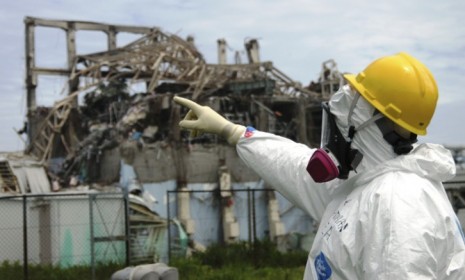Fukushima's 'nuclear gypsies'
Thousands of unskilled workers are toiling at Japan's tsunami-ravaged nuclear plant, risking radiation exposure for $127 a day

A free daily email with the biggest news stories of the day – and the best features from TheWeek.com
You are now subscribed
Your newsletter sign-up was successful
For decades, Japan has relied on unskilled laborers from all over the country to build and repair its nuclear power plants. Now these "nuclear gypsies" are providing the muscle to clean up the site of the worst nuclear accident Japan has ever experienced — the meltdown at the Fukushima Daiichi plant caused by a massive earthquake and tsunami in March. Here, a brief guide to their plight:
Who are these nuclear gypsies?
They are construction workers, truck drivers, and unemployed men from across Japan. Some have been recruited from day-labor centers where jobless people gather hoping to find work. They have been hired by 100 or so subcontractors working for the major construction companies tasked with mopping up outside the Fukushima reactors that melted down. There are nearly 3,000 people working at the site today, and of them, only about 375 are better-trained Tokyo Electric Power Company (TEPCO) employees who clean up inside Fukushima.
The Week
Escape your echo chamber. Get the facts behind the news, plus analysis from multiple perspectives.

Sign up for The Week's Free Newsletters
From our morning news briefing to a weekly Good News Newsletter, get the best of The Week delivered directly to your inbox.
From our morning news briefing to a weekly Good News Newsletter, get the best of The Week delivered directly to your inbox.
Are the nuclear gypsies paid well?
By their standards, yes. Day laborers willing to work inside the plant's gates reportedly make three times the going rate. Those in the evacuated area surrounding the plant get time and a half. Two truck drivers sent to the plant had responded to an ad offering 12,000 yen, or about $127, a day. That's a fraction of what TEPCO employees make — reportedly an average of $96,000 a year — but for many nuclear gypsies, it's a welcome windfall. "I think my wage is fair for the kind of work I do," says Ariyoshi Rune, 47, as quoted by Britain's Guardian. "It's more than I used to get driving a truck."
Isn't the work dangerous?
Yes, nine TEPCO employees have already been exposed to radiation levels beyond the maximum annual limit of 250 millisieverts. Rune has been exposed to 5 millisieverts, which is already more than double the annual average background dose worldwide. His employer will force him to quit once he hits 15 millisieverts. But some workers say it's the heat, not the radiation, that worries them, as they toil away in stifling, head-to-toe protective suits. "It is unbelievably hot inside those suits," one worker told the Guardian. "I know of several people who have been taken ill on the job."
A free daily email with the biggest news stories of the day – and the best features from TheWeek.com
So are these workers sacrificing their health?
In some cases, yes. Early on, hastily hired workers were sent to the plant with little training or equipment — some even worked without radiation meters. And most still haven't received standard training on radiation risks. They come from the poorest parts of Japanese society, and employers frequently lose track of them once the job is done, making it impossible to monitor their long-term health. "I can only think that to the power companies, contract workers are just disposable pieces of equipment," said Kunio Horie, who wrote about his 1970s experience at nuclear plants, including Fukushima Daiichi, in the book Nuclear Gypsy.
Can anything be done to improve safety?
Human rights activists hope so. They have been calling for changes to protect the nuclear gypsies, and TEPCO has responded by increasing the number of rest areas, installing more water coolers, and passing out coolant vests to prevent heatstroke. Cleanup workers typically complete a 90-minute shift, get a break of similar duration, then log another 90 minutes before calling it a day when the heat peaks shortly after noon. The changes came after TEPCO's own medical consultant said that overworked, tired cleaning crews faced an elevated risk of accidents.
Sources: Asia Rights, Guardian (2), Mail & Guardian